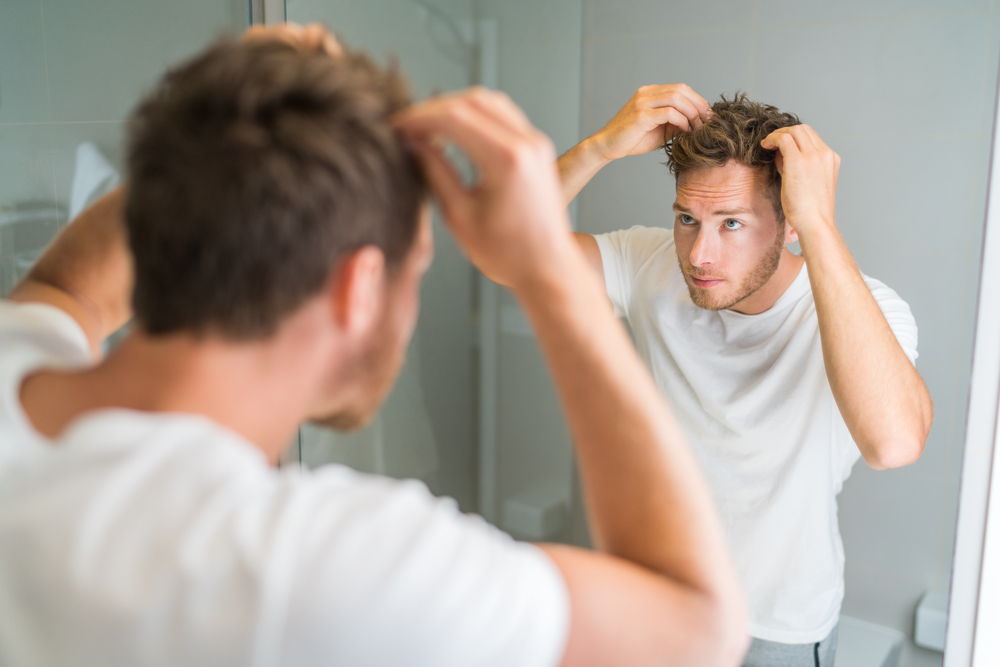Understanding why your hair might be thinning is the first step toward fixing it. Hair loss can be frustrating, but knowing the reasons behind it can help you take the right steps to get your hair looking fuller and healthier.
Losing around 50 to 100 hairs a day is normal, as part of the hair growth cycle. However, if you’re losing more hair than usual or noticing thinning, it might be a sign of a problem.
Here are some common reasons why your hair might get thinner:
- Genetics: Sometimes, hair loss runs in the family. This is called androgenetic alopecia, or pattern baldness. It often starts in your 20s and results in a gradual thinning or receding hairline.
- Hormonal changes: Hormones play a big role in hair health. Changes during pregnancy, menopause, or thyroid problems can lead to hair thinning. Conditions like polycystic ovary syndrome (PCOS) can also affect your hair.
- Nutritional deficiencies: If you’re not getting enough essential nutrients like iron, vitamins, and proteins, your hair might suffer. A lack of B vitamins, zinc, and biotin is especially known to affect hair health.
- Stress and lifestyle: High stress levels, whether from work or personal issues, can trigger hair loss. A condition called telogen effluvium can cause hair to shed prematurely due to stress.
- Medical conditions and treatments: Some medical conditions, like autoimmune disorders, and treatments like chemotherapy, can cause significant hair loss. This often leads to temporary but noticeable shedding.
Hair thinning happens when the natural cycle of hair growth is disrupted. Hair grows in three phases: growth, transition, and rest. When this cycle gets messed up, it can lead to premature shedding and thinner hair.
- Weakening hair follicles: If hair follicles get damaged or weak, they produce thinner and shorter hairs.
- Reduced hair production: Less active hair follicles mean slower new hair growth, which can result in thinner hair over time.
- Excessive shedding: If the hair growth cycle gets out of balance, especially due to stress or illness, more hairs might fall out than usual.
In the next section, we’ll share some helpful tips to fight hair thinning and help you grow thicker, fuller hair. From making changes to your diet to tweaking your hair care routine, you’ll find practical advice to boost the health and appearance of your hair.
How to get thicker hair
If you’re aiming to grow thicker, fuller hair, there are plenty of practical steps you can take. Here’s how to give your hair the boost it needs:
Eat a balanced diet
What you eat can really affect your hair. Make sure your diet includes plenty of:
- Proteins: Hair is made of protein, so having foods like lean meats, fish, eggs, and beans can help keep your hair strong and healthy.
- Vitamins & minerals: Vitamins A, C, D, and E, along with iron, zinc, and biotin, are great for hair health. Try to eat a mix of fruits, veggies, nuts, and seeds to get these nutrients.
Drink plenty of water
Staying hydrated is key for keeping your hair and scalp healthy. Aim for about eight glasses of water a day to help your hair stay moisturised and support its growth.
Use gentle hair products
Choosing the right products can make a big difference:
- Shampoos & conditioners: Pick ones that don’t have harsh ingredients like sulphates or parabens. These can strip your hair of its natural oils and cause damage.
- Hair masks and deep conditioners: Use deep conditioners or hair masks regularly to keep your hair well-nourished and strong.
Limit heat and chemical treatments
Too much heat or chemicals can weaken your hair. Here’s how to avoid damage:
- Heat styling: Use blow dryers, curling irons, and straighteners on the lowest heat setting, and try to use them less often. Always apply a heat protectant before styling.
- Chemical treatments: Try to cut back on colouring, perming, or relaxing your hair. If you do these treatments, follow up with conditioning to help your hair recover.
Get regular haircuts
Trimming your hair every 6-8 weeks helps prevent split ends and keeps your hair looking healthy. It also encourages new growth by removing damaged ends.
Take care of your scalp
A healthy scalp is essential for good hair growth:
- Massage: Gently massage your scalp for a few minutes each day to improve blood flow and help your hair follicles.
- Exfoliate: Use a scalp scrub or exfoliating shampoo once a week to remove dead skin cells and keep your scalp in good shape.
Consider supplements & treatments
If you’re not getting all the nutrients you need from your diet, supplements might help:
- Biotin: This vitamin is known for supporting hair health and strength.
- Omega-3 fatty acids: Found in fish oil or flaxseed oil, these can nourish your hair and support growth.
- Multivitamins: A good multivitamin can fill in any gaps in your diet.
You can also use private treatments like finasteride that’ll help you to prevent future hair loss, grow thicker hair, and regrow hair that you’ve already lost.
By following these tips, you can help your hair become thicker and healthier. Keep in mind that results take time, so be patient and stick with it. With consistent effort, you’ll be on your way to fuller, more vibrant hair.
Frequently asked questions about hair loss
What are the best foods to eat for thicker hair?
Eat proteins like eggs and fish, vitamins from fruits and veggies, and iron-rich foods like spinach. Omega-3s in nuts and seeds also boost hair health.
How can I prevent hair thinning due to stress?
Manage stress with relaxation techniques, exercise regularly, and maintain a balanced diet. Adequate sleep also helps reduce stress-related hair loss.
How to strengthen hair and reduce breakage?
Use protein-rich conditioners, avoid excessive heat styling, and trim regularly. Also, minimise chemical treatments and gently detangle wet hair.

